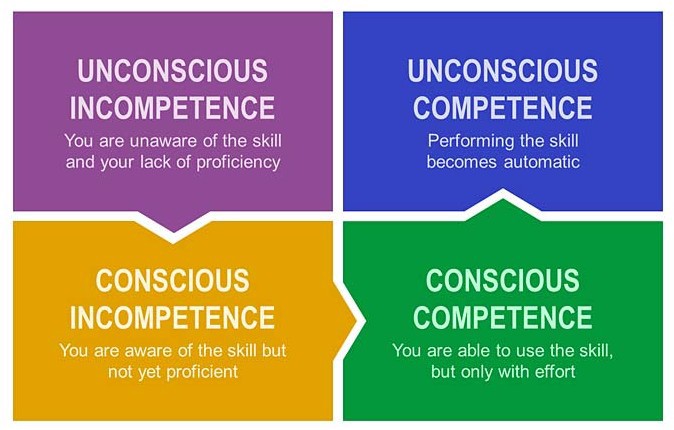The “Four Stages of Competence” is a learning model from psychology. The stages are as follows: (1) unconscious incompetence, (2) conscious incompetence, (3) conscious competence, and (4) unconscious competence. In the 1st stage, you are doing something wrong and not aware of it. In the 2nd stage, you are learning a new skill but still can not do it correctly. In the 3rd stage, you are finally developing the skills but it takes a lot of work and thought. In the final stage, you don’t have to think about it anymore. The skill moved into your subconscious, like riding a bike.
Applying these stages to proper breathing, the majority of people are in the “unconscious incompetence” stage. More specifically, people in this stage believe that breathing is an unconscious action that we all do to survive and that there is not a right or wrong way to breathe. In reality, most people in this stage are mouth breathers suffering from a host of problems including anxiety, asthma, poor sleep, digestive issues, cardiovascular problems, and suboptimal performance. To move from this stage and away from these issues, these people must transition to a conscious state of incompetence first.
“Until you make the unconscious conscious, it will direct your life and you will call it fate.” Carl Jung
When you develop an awareness that the proper way to breathe is through the nose activating your diaphragm you have developed “conscious incompetence.” More specifically, you are aware that mouth breathing can have terrible complications, you catch yourself breathing with your mouth during the day and return to nasal breathing. Your eyes are open and you are ready to learn more.
Next, we move from “conscious incompetence” to “conscious competence?” Moving to this stage requires coaching, practice, and time. You can begin this transition by taking an online breath course or one on one coaching but you have to put in the work outside of the course or coaching. As with any skill, you must practice. This where a conscious breath practice comes in.
A conscious breath practice involves sitting or lying down for as little as five to ten minutes a day. An easy way to start this is by using “box-breathing” to focus on your breath and create a mindfulness practice. You can play around with the length of the inhales, exhales, and holds while you feel your breath expanding and diaphragm moving. Through this practice, you realize the value of focusing on the breath for a short period to start your day will allow you to become less reactive throughout the day. Occasionally you will catch yourself mouth breathing sitting at your desk causing tension in your neck and shoulders. With a conscious breath practice, you will recognize this pattern and return to diaphragmatic breaths through your nose. This will calm you down quickly. As your practice expands, proper breathing mechanics will begin to come naturally. This is when you are moving to “unconscious competence.”
As you move into the “unconscious competence” stage, you will notice a more calm and relaxed version of yourself. For example, in the past, you were quick to lash out at others. Now, things roll off your back and you are less reactive. While you will still have a daily breath practice, your breathing patterns during the day are natural and you rarely have to think about them. You might just catch yourself slowly inhaling and exhaling while in traffic instead of getting upset and angry. As Viktor Frankl said, “Between stimulus and response there is a space. In that space is our power to choose our response. In our response lies our growth and our freedom.” The breath provides you with the freedom to live a better life but it takes practice and focus. You must commit to the work of moving up the stages of competence. You have the power to do this.
Putting it all together
While learning any new skill takes time and effort, remember the stages of competence as you progress. If you are reading this article, you are at least in the “conscious incompetence stage.” This is where progress begins to happen. It is now time to take matters into your own hands and seek out someone to help coach you.
You are the writer of your own story and the hero of your own journey. Taking control of your breath can completely change your mental state, health, and life.
As you expand your daily breath practice, Symmetry is here to help. We have created an Introduction to Breath program that will help you become more efficient using oxygen, better handle stress and improve your sleep. This program will be available next week and can be purchased at www.symmetry.live or contacting me directly.
Call to Action
If you are looking for more individualized help, please contact me through my website www.symmetry.live. I create individualized breath programs for my clients to help them achieve their goals.
If you enjoyed this post, you can also signup for my free weekly newsletter, The Long Game. The Long Game is a newsletter for people that want to grow and challenge themselves. It is about the drive to better ourselves mentally, physically, and spiritually while having the curiosity to enjoy the journey.


